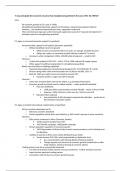‘It was principally the economic recovery that strengthened apartheid in the years 1961–68. HFDYA?
Intro:
- SA economic growth at 5% a year in 1960s
- Strengthened apartheid (domestic support for NP policies, reduced international criticism)
- However… also weakened apartheid (pass laws, opposition continued)
- More convincing to argue gov action (increased suppression, pursuit of ‘separate development’) =
principle reason for strengthening apartheid
P1: Agree as increased domestic support for apartheid
- Increased white support for NP policies (therefore apartheid)
o Whites benefitted more from growth
White incomes increased by 50% in 10 years, on average 12x black incomes
Whites per capita car ownership (wealth indicator) ranked 4 th in world
o Increase in white immigration (1960s, 250,000 white immigrants – voted for NP)
- However…
o % white SAs peaked at 22% 1921 – fell to 17% by 1968, reduced NP support group
o White support insufficient explanation for strengthening apartheid
- Blacks were less likely to challenge apartheid
o Manufacturing employment (mostly black) doubled 1951-1975 (855,000 1.6mil)
o Africans doing white collar work increased from 75,000 to 420,000, 1951-75
o Black SA 1960s per capita income increased by around 23%
Industrial workers’ wages rose 50% in decade
- However…
o Colour bar remained (jobs reserved for whites, e.g. plumbers/electricians)
o Economic growth increased need for skilled workers – made apartheid unfeasible
Pass laws ineffective
1968 pass offence prosecutions reached 700,000 – nearly 2x that of 1960
However, 1960s, Africans in cities rose by 1.5mil to over 6mil
Education flaws exposed
low productivity & skill shortages hampered diversification – partly due to
discriminatory education system
P2: Agree as limited international condemnation of apartheid
- African countries dependent on SA
o Botswana, Lesotho, Swaziland
o Meant opposition activity there was limited (e.g. ANC couldn’t operate in some countries)
- However…
o Exile activity continued in Africa (Tanzania, Zambia)
Tambo based in Zambia from 1967
1967 Wankie campaign, 1968 Sipolilo campaign
o African opposition regardless of economic growth
1963 Organisation of African Unity formed, issued procedures vs SA including fund
for liberation
o Inability to operate in Africa more clearly attributed to gov action
Vorster became PM 1966, acted pragmatically on diplomatic front
E.g. cemented links with Hasrings Banda (Malawi president)
Though arguably only because of economic growth (enabled him to offer
trade relations, technical training & economic advice)
- Trading partners saw SA as economically important
o Ties with US & Britain (1960s massive overseas investment – further boosted economy)
o Japan became important trading partner
o Connections with SA due to economic growth because




